The Timeless Children
I just watched The Timeless Children, the finale of the latest season of Doctor Who. I didn't like it very much.
Let me put it this way: the story features a thing called "The Death Particle". And that's not the dumbest thing in the episode. It's like the fourth or fifth dumbest thing.
I ended by asking myself a question: Why do I keep watching Chibshow?
(Note for people not steeped in DW fandom (why are you reading this?): Chibshow = seasons 11 and 12 of the DW revival, featuring a new doctor, all-new actors, and a new showrunner/lead writer, Chris Chibnall. Shifting in tone under a new creative team every few years is normal for DW. The reason this incarnation gets a nickname like "Chibshow" is because, well, it feels like a different show. Not in a good way.)
Why don't I just say "hey, this show is not for me anymore" and watch something else? That would be the healthy, well-adjusted response. There's no point hatewatching something just to snark on it, or to write 10,000 word blog posts about how bad it is.
I don't wanna hate this show. I want it to be good. It's been good before, it could be good again. I especially want "First female Doctor" to be good. It's painful that, so far, Chibshow is bad, and not even bad in a fun way, bad in a boring, hollow, soulless way. The production values are great and there's a diverse cast who are trying their best, but the writing gives them nothing to work with. The writing just has nothing to say. Not about its characters, not in terms of themes or real-world issues. Chibshow isn't about anything.
[it could be slightly better written]
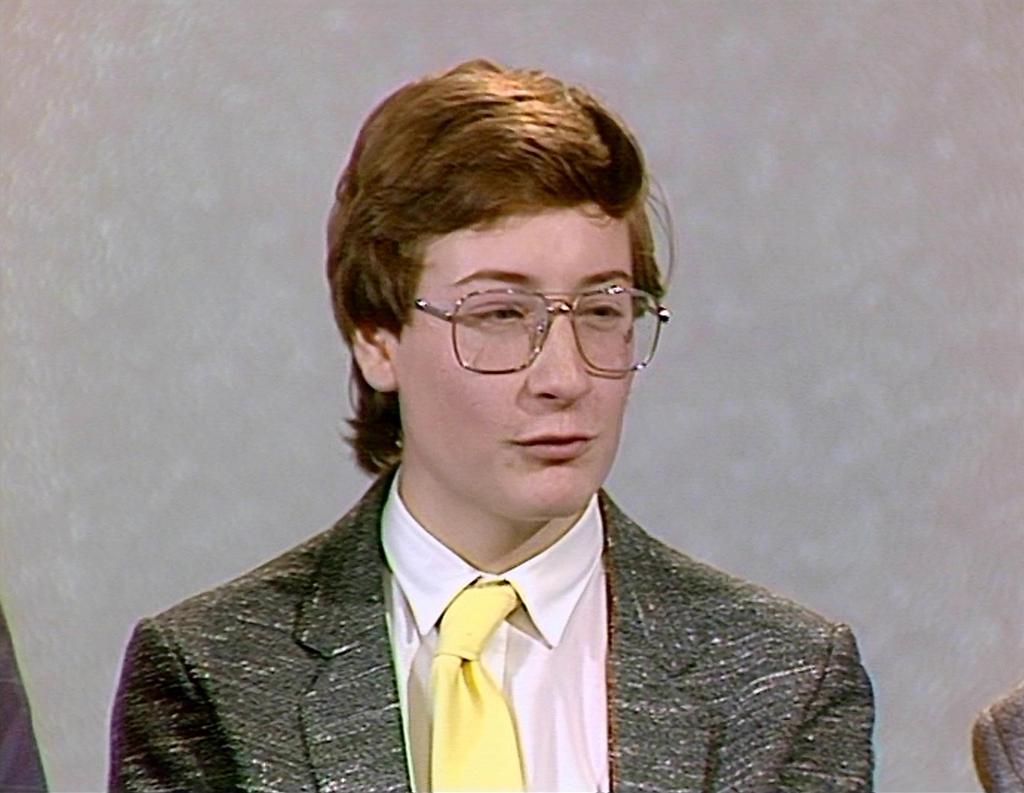
(that's 16-year old Chris Chibnall from an interview where he complains about DW in 1986)
There's only one reason I can think of to keep watching: Because I'm learning so much about bad writing. I'm trying to get better at writing, especially writing dialogue and subtext, areas where Chibshow regularly fails. I'm not being sarcastic when I say examples of what not to do can be even more valuable as a learning tool than good examples.
Last night was the season finale, the climax, the one with the shocking retcons. The preview quote was literally "Everything is about to change... FOREVER!" The big statement. The Chibnall Masterplan, that we've been building to for two seasons, revealed! ...and it landed like a damp napkin.
This isn't a review, this isn't Red Letter Media trash-talking the Star Wars prequels, I'm not here to snark (well maybe snark a little). I'm here to dissect:
- what dramatic impact Chibshow was trying to have?
- why didn't it work?
- what can we learn to apply to our own writing?
SPOILERS SPOILERS SPOILERS SPOILERS SPOILERS I'm spoiling the whole season, stop reading here if you wanna watch it and haven't, SPOILERS SPOILERS SPOILERS
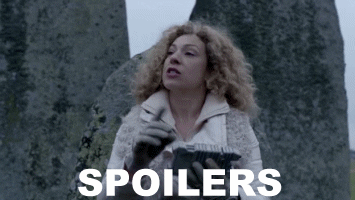
1. A Fake Dilemma
Our main plot begins at the end of "Haunting of Villa Diodati". The climactic dilemma here is between letting Ashad (the Lone Cyberman) get a McGuffin called the Cyberium, which will kill a zillion people in the far future, or letting Lord Byron die.
"Climax with an argument over a moral dilemma" is a fine structure for Chibshow to follow. But:
First problem: The Doctor accepts the terms of the dilemma immediately. This sucks because one of the doctor's defining traits is resolving a seemingly impossible dilemma by finding a third way that nobody else has considered. The Doctor has stopped entire armies of cybermen with eleventh-hour technobabble nonsense before. Having her give up this easily is out of character.
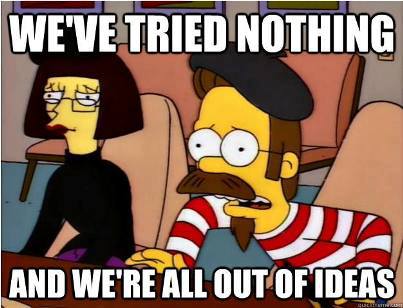
If your script needs to force the Doctor to hand over the McGuffin to the baddies, you need to put in the work of bringing up and ruling out other options.
Second problem: This is a fake dilemma. We know, for meta reasons, the Doctor's never gonna make the choice that changes history.
(Maybe if you've never seen DW before you might think there's a real possibility of the Doctor letting Byron die. If you have, you know there's like twenty different mutually-contradictory technobabble explanations for how time travel works, but they all have a single story function, which is to be a reason the Doctor isn't allowed to change known, real-world Earth history. Otherwise, the Doctor would have killed Hitler like five times already!)
You want tension, you need to convince the audience that a scene has more than one plausible outcome.
The third and worst problem: The implications of the Doctor's argument are horrific and Chibshow doesn't even notice.
2. Famous People Are More Important
Engaging with the fake dilemma, the Doctor says they can't kill Lord Byron. Ryan argues that saving a zillion lives is more important than saving one life.
In real-world morality, Ryan is right, and the Doctor is wrong. But in Doctor Who logic, Lord Byron's single life does matter more because he's a real history person and the Cybermens' zillion future victims are imaginary sci-fi people.
It's not bad writing for the Doctor to be wrong side sometimes. It's good when the Companion is the show's moral compass. The bad writing is that Chibshow doesn't know or care that Ryan is right. The Doctor just overrules Ryan by pulling rank on him. It's ugly.
Chibnall's following a structure. The structure says the Doctor needs to resolve the scene with a big inspiring speech. For meta reasons, Chibnall is backed into the corner of writing a big inspiring speech defending the objectively morally wrong conclusion that millions of people should die to save Lord Byron.
(If you every find yourself writing your hero a speech defending the indefensible, maybe take it as a sign to step back and consider a different direction for your story...)
The speech is this "Words matter!" thing focusing on how important Byron's writing is, and how much it influences history.
Uh, wait... does the Doctor think that Byron matters more than zillions of other people's lives because ... Byron is famous ? Is that it?
:shocked angry face:
I don't think for a second Chibnall meant this or that he wants this morally horrific implication to be the message. It's an accident. Because his writing is pure plot function, he's writing a speech to fill the needs of the structure, not thinking what it means on a character or ethical level.
(A fix: replace Byron with an unknown, random person from the past. That way the outcome isn't foreordained AND the Doctor making a stand on the importance of a single not-famous life is a much better moral statement.)
Speechifying without thinking through the ethics... that reminds me of...
3. Thirteen's Thing With Guns
- The doctor teleports Tim Shaw's DNA-melting bombs inside Tim Shaw's body: fine
- Somebody pushes Tim Shaw off a bridge: "You had no right to do that"
- Ryan shoots at sniperbots (robots!) with a laser gun: doctor gets mad at him
- Doctor kills the sniperbots with an EMP grenade: fine
- Letting the giant spiders slowly starve to death: fine
- Shooting the slowly-dying giant spider with a gun to put her out of her misery: doctor is very upset (but does nothing)
- Graham threatens to shoot Tim Shaw with a gun: "No Graham! if you kill him you'll be just as bad as him!"
- the Ux commit genocide on five planets: doctor doesn't really seem to blame them
- Graham and Ryan instead of shooting Tim Shaw, condemn him to eternity of torment in his own stasis chamber: fine
- Ada Lovelace wants to shoot the Master with a steampunk machine gun to stop him killing anybody else: Doctor stops her
- Using a grenade-type weapon insted: fine
- Doctor hands over the Master to literal Nazis after making them think he's a british spy and revealing he's not white: Fine
- Ruth-doctor has a big laser rifle: 13 is like "ohh noooo you can't be me"
- Ruth-doctor "gives up" the rifle to the bad guy but it's rigged to backfire: 13 is shocked, shocked I tell you
What kind of ethics are these? Seems like 13 cares more whether a weapon is gun-shaped than whether the use of it is justfiied or not. She's like a strawman liberal from an NRA political cartoon.
The gun thing is just an example of the deeper issue: Chibshow writes "the doctor moralizing about violence" because The Doctor Moralizing About Violence is part of the "DW Formula" that Chibshow is following, but because Chibshow has nothing to say and no consistent moral framework, it's a hollow shell of a formula with no actual content.
Here's yet another example:
4. Mindwipes Are Bad
Mindwipes are bad, OK? Among the worst things The Doctor has ever done was mindwiping Donna in "Journey's End" (Tenth Doctor, 2008). It was so awful that the climax of "Hell Bent" (Twelfth Doctor, 2015) needed to feature a sort of atonement for it. The Doctor has learned their lesson and renounced memory-wiping anyone against their will. Character growth!
... except not, Thirteen just casually mindwipes Ada Lovelace and Noor Inayat Khan in "Spyfall, pt. 2" (2020) because it's essential that they not know the future, to preserve the course of history! (handwave handwave). Moral un-learned, apparently.
She doesn't mindwipe Nikola Tesla, or Thomas Edison, or Mary Shelly, or any of the other history people who learn about the future this season. The more people she doesn't mind-wipe, the weirder the Ada Lovelace thing gets.
In fact, Thirteen gives Lord Byron (Ada Lovelace's dad!) knowledge of his own future death, to save his life and thus preserve the course of history. "Big fan of your daughter", she says. ("Too bad I had to erase her memory", she does not say.)
(?!?!?)
Is there any moral consistency here? As far as I can tell, none. (Also, BTW, "preserving the course of history" for Noor Inayat Khan means she gets killed by Nazis. Uhhh. I guess we'll just gloss over that. )
Having a consistent ethical foundation doesn't mean "turn to the camera and lecture the audience about the moral of the story" (like in "Orphan 55"!) it means building your ethics into the decisions characters make and the results the decisions have.
Chibshow does not have this. A consistent ethical framework is not even on its radar. A huge problem if your show uses moral dilemmas for climaxes!
I'm not saying the Doctor has to always do the right thing. Previous Doctors have been chaotic, made mistakes, gone too far. ("Has The Doctor gone too far this time?!?" is practically a cliche). The way you make that work is, like, we'd see the Ninth Doctor through Rose's POV, and when the Doctor starts Going Too Far, the emphasis is on Rose's reaction - she calls him out on it, or we see from her face that she's shocked and horrified, or we play out the bad consequences of the Doctor's mistake, and it would be part of the Doctor learning to be better.
Chibshow doesn't have the level of subtextual nuance to pull off those moments. Its POV is undefined, there's no other character around to react to Ada Lovelace's mind-wipe, nobody calls the Doctor out, it's not part of a character arc where the Doctor learns to not mind-wipe people, there's never any consequences for bad decisions.
The resulting vibe is that Thirteen just behaves randomly, the show has no particular opinion about it, and once in a while she gives a big lecture about morals that's completely unsupported by the episode.
In "The Timeless Child", the Doctor discovers that the Time Lords wiped her memory! Multiple times! What a shocking betrayal! We're supposed to see it as an outrageous injustice against the Doctor, and maybe we would if the Doctor's hypocrisy was ever addressed by the show. Maybe if Chibshow had a consistent ethical framework, this discovery could have made the Doctor confront the consequences of her careless memory-wiping... you know, a character arc ? Where a character learns and develops over time, instead of just flip-flopping randomly?
And that, finally, brings us to the big reveal of "The Timeless Children". The retcon.
4. The Big Reveal Is Kind Of Pointless
The big retcon is that the doctor isn't Gallifreyan, she's "unknown mystery species" from "unknown mystery planet" who predates Time Lord society, could always regenerate infinity times, Time Lords copied her regeneration power and wiped her memory.
OK.... that's it? So what?
The preview for the episode has the Master saying "everything is about to change" and they've been teasing it all season long. (Two seasons, if you count the time in The Ghost Monument where a flying scrap of fabric that can somehow talk (I am not making this up) gives us a single throwaway reference to "the timeless child".) Clearly this is supposed to be big. The fact that I'm reacting with "so what?" means it's not working.
Honestly, from the time the Master teased us by saying "Gallifrey is built on the lie of the Timeless Child", I had been assuming some kind of "Those Who Walk Away From Omelas" situation, some shocking moral horror. Maybe the timeless child is chained up in a basement and every time a Time Lord regenerates anywhere it comes from some technobabble being painfully extracted from the child. So when the actual reveal is just "The child is you!", it was a letdown.
The problem here is that Chibshow thinks that rewriting Ancient Gallifrey Lore is inherently interesting, that it can be the purpose of a story instead of serving the purpose of a story.
Chibnall obviously cares about Old Series Lore. This season has been littered with references to the "deep cuts" of 70s DW: the Tissue Compression Eliminator! Cybermen being allergic to gold! The Matrix and the Panopticon! I think Chibnall genuinely loves this stuff and is happy to bring it back. But does it serve any story function? Or is it just there to stimulate the nostalgic pleasure centers in the brains of 55-year-old DW fans and send them rushing off to update Tardis.wikia.com?
I'm sure tardis.wikia.com is freaking out over all the articles that they have to edit right now that The Doctor "was never a Time Lord" at all !!
But what's the storytelling purpose of big lore rewrites? What's the purpose of this rewrite? What reason do we have to care about it, in this story, not on Tardis.wikia.com?
We only care about Time Lords because The Doctor is a Time Lord. We only care about Gallifrey because that's the place the Doctor ran away from. If the Doctor's from somewhere else, then we have no more reason to care about Gallifrey or Time Lords. But OK, we'll just replace that with caring about the new place the Doctor is from. (Or not.)
Weird choice in an episode that then wants us to go straight back to caring about Time Lords for the climax.
5. The Doctor's Origins Don't Matter
The Doctor being the Timeless Child instead of a Time Lord doesn't matter to 90% of DW episodes. They're still a mysterious traveler with a blue box that's bigger on the inside, they have one or more companions who are usually normal present-day earth humans, they show up at some random point in time and space, something is wrong, they find clues, they have an adventure, they solve the problem, they escape. That is all you need to know to enjoy a DW story. The rest of the setup -- the worldbuilding, the stakes, the theme -- is inside the story itself.
Doctor Who is good when the individual adventures are good. When they give us some some good character development, worldbuilding, themes, something meaningful to say about the real world, in between the TARDIS landing and tthe TARDIS taking off again. Tying adventures together is a fun bonus but not essential.
They don't need Deep Lore about the doctor's origins to be good.
(i'm afraid Chibshow thinks that Doctor Who is good when it gives fans a lot of tardis.wikia.com edits to make.)
I'm not opposed to retcon-ing this stuff. DW lore is nothing but retcons!
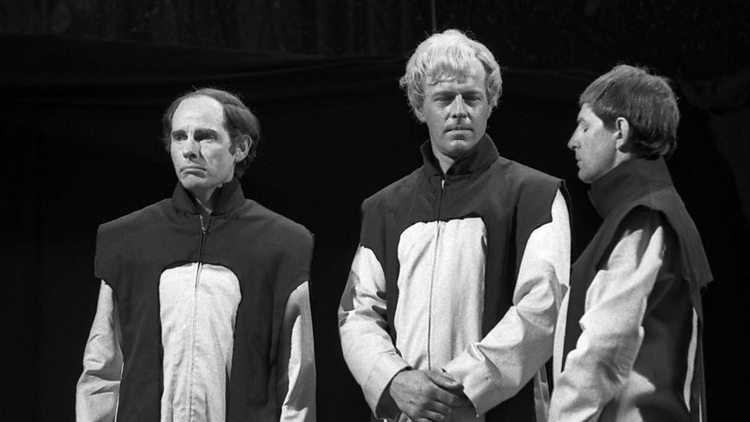
- For the first six seasons (the black & white ones in the 60s) the Doctor didn't have an origin story. At first he was vaguely implied to be a human inventor from the future!
- He wasn't a Time Lord until the Second Doctor's last story, "The War Games" (1969), which created Time Lords as antagonists, defined as "the people the doctor ran away from because they were boring".
- The Doctor didn't have two hearts until a human doctor used a stethoscope on the Third Doctor in "Spearhead from Space" (1970) and said "WTF you have 2 hearts".
- The word "Gallifrey" was first spoken by a Sontaran to Jon Pertwee in "The Time Warrior" (1974), in a throwaway line that's just there to establish that the villain is knowledgable.
- There wasn't a 12-regeneration limit until "The Deadly Assassin" (1976) invented it to give the Master a motivation (and fans at the time complained loudly about how much this story retconned!)

Nothing about any of this Lore is sacred, I'm not opposed to retcons, if they open up new possibilities.
It doesn't bother me that Season 12 "undoes" Day of the Doctor by re-creating the status quo of the RTD era. A show running for almost 60 years is gonna repeat plotlines. The only question is: Can you tell better stories with Gallifrey destroyed or with Gallifrey around?
I'm opposed to making a Big Lore Rewrite the point of a season.
6. Lore Should Serve The Story
Lore should serve the purpose of the story -- this story about these characters, right now. A good reveal should escalate the conflict of the story, or turn it in a new direction, and lore reveals are no different.
For example, Robert Holmes, writing "The Deadly Assassin" (a story "The Timeless Children" references at length), created the 12-regeneration limit for a story purpose - it's to give the Master a motivation (he's run out, see, so he wants to steal other peoples' lives). Revealing it escalates the conflict by showing us what's at stake and what the Master will try to do next.
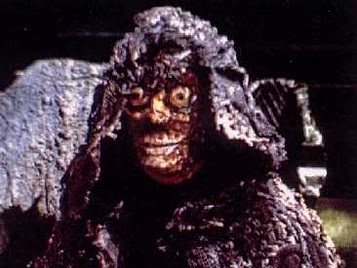
In "The Timeless Children", the reveal doesn't do that -- the conflict is stopping the Cybermen / the Master / the CyberMasters. The timeless child reveal is a distraction from that conflict, not an escalation. We just pause the main Cyberman invasion story for 20 minutes to infodump about the timeless child, then resume the Cyberman invasion story.
If Deadly Assassin had been written Chibnall-style then the whole story would be teases leading up to the Shocking Twist of a 12-regeneration limit, delivered in an infodump monologue, then an unrelated climax.
"Day of the Doctor" did a Big Lore Rewrite, but it served a story that was about the Doctors confronting how much they have changed, how their reaction to Time War angst has been helpful or unhelpful, and whether there's a way to correct their mistakes. The Big Lore Rewrite wasn't delivered to the Doctor as an infodump lecture, it was the result of a thing the Doctors did to solve the main problem of the story. The Tardis.wikia.com updates were a side-effect.
The difference between the Doctor taking actions that change lore, and the Doctor being told that the lore has changed, brings me to a controversial theory of writing I like to call:
7. Your Protagonist should Do Things
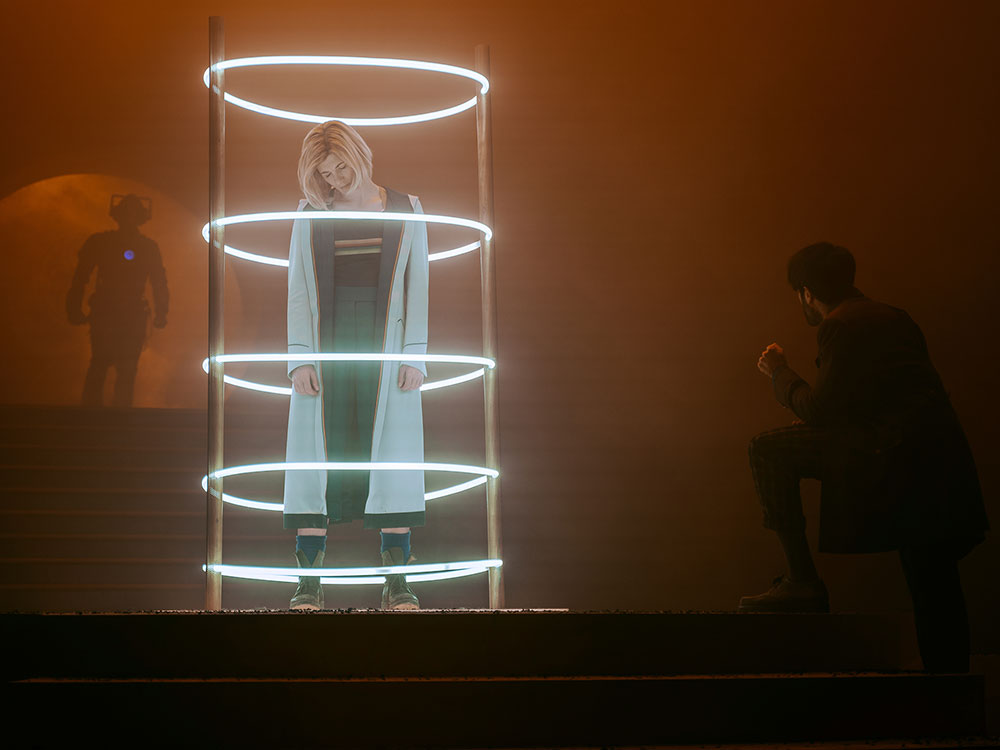
The whole middle of "The Timeless Children" was just "Doctor is imprisoned in glowy rings and has the new lore explained to her at great length while doing nothing but making pained faces". And it's not like she does a whole lot before or after that, either.
- She came to this time period to stop Ashad from doing something awful with the Cyberium, and... actually the Master kills Ashad. Oh.
- She promises to save the human refugees from the Cybermen, and... her gadgets are defeated, her plans don't work, she mostly just runs away from Cybermen with the refugees until they all get to the Boundary.
- At the Boundary, she surrenders to the Master. She says she wants to stop him, but mostly she follows him around listening to his exposition.
- After she escapes, she goes to sacrifice herself to destroy the Cyber-Timelords, but then... doesn't. More on this in a bit.
- But, you know, fine, the Doctor doesn't have to do everything. The companions should be the real protagonists anyway!
- Ryan, Yaz, and Graham's contribution was... to escape some generic cyber-mooks, and rescue some generic extras, in a subplot completely disconnected from the main plot. Nothing about the main plot would be different if they were written out.
Everything that actually happens in this story is done by Ashad, the Master, or Ko Sharmus. It's like a role-playing game where the GM's NPCs do everything, while the player characters watch.
We should focus more on Ryan, Yaz, and Graham and their personal stories! Which are... um...
8. Who Are These People, Anyway
RTD's biggest innovation when reviving DW in 2005 was to make a show about Rose's character arc. In retrospect it's so obviously the direction DW had to change in order to work as modern TV. Chibshow has forgotten that, and gone back to the 1980s model of DW where the companions' jobs were to ask the Doctor questions, receive exposition, get menaced by monsters, scream, run, get captured, etc.
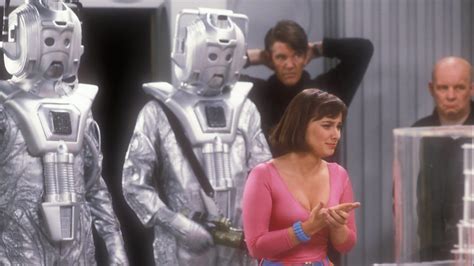
This is the era Chibshow aspires to re-make (not coincidentally, it was the era when DW thought Revealing Ancient Gallifrey Lore was the most interesting thing it could do. )
Ryan, Yaz, and Graham are barely characters. I'm trying to think of what I'd have them do in this story. It'd help if they'd had any kind of arcs in Season 12.
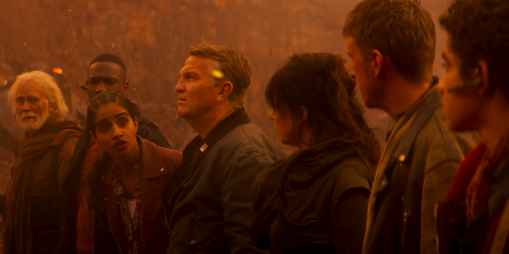
Not only is 3 companions a lot to write for already, but every story seems to involve a huge cast of 5-10 NPCs. Ryan, Yaz, and Graham get lost in the crowd. Most of this season they've been shuffled out of the way onto side-quests of varying relevance.
The single biggest improvement you could make to Chibshow would be defining who these three characters are: giving them issues to focus on, giving them their own motivations, differing outlooks, conflicts with each other, and then let all those things evolve over a season character arc. You know, extremely basic bread-and-butter TV writing. It is bizzare how little Chibshow cares about its characters.
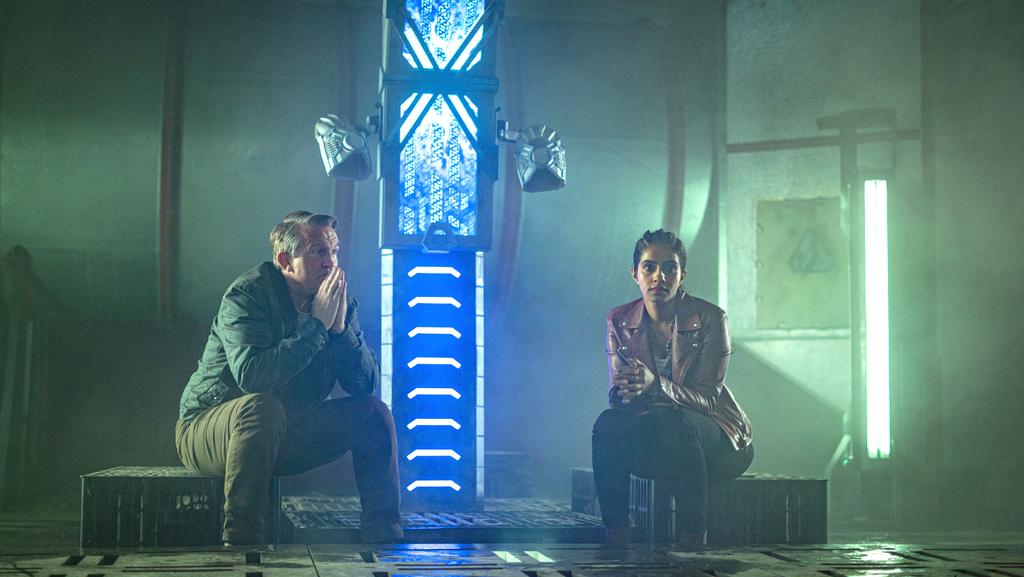
There's a scene that sums this up perfectly. A quiet scene between Graham and Yaz with a lot of dialogue that basically boils down to "Yaz, you're a good person" "You too Graham".
Chibnall must have recognized (correctly) that Graham and Yaz have never really interacted before, and tried to fix it. That's a good instinct. It could have been a good time to resolve some tension between these two that's been simmering for several episodes... if there was any.
Instead, the dialogue is so generic that (except for the one joke about Yorkshire) anybody could be saying it to anybody. If you're ever writing dialogue that's interchangeable between characters, something is very wrong. Graham and Yaz are so poorly defined that Chibshow can't think of a thing for them to say to each other more specific than "You're a good person".
When Missy said "These are my sidekicks: Exposition and Comic Relief", she was making a mean joke about the old series, not giving writing advice to the next showrunner!
9. Fake Dilemma, take 2
The climax of The Timeless Children: Thirteen is holding The Death Particle in a room with the Master and a bunch of Cyber-Timelords. Just like in the Lord Byron situation, Thirteen has jumped straight to "I have to sacrifice myself and re-genocide Gallifrey, it's the only way" without even trying any other ways.
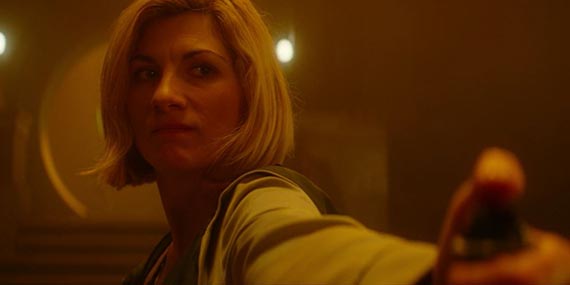
I don't even care that the Death Particle is inside a tiny action figure, or that she's threatening death to a room full of people who can all regenerate, or that she's playing it like a self sacrifice when we've just learned she can regenerate infinity times. Whatever, let's pretend there was dialogue establishing that "The Death Particle kills you times infinity-plus-one" and move on.
Lucky thing the Death Particle is an action figure, and not like a gun or something! Thirteen might genocide a planet, but she draws the line at guns!
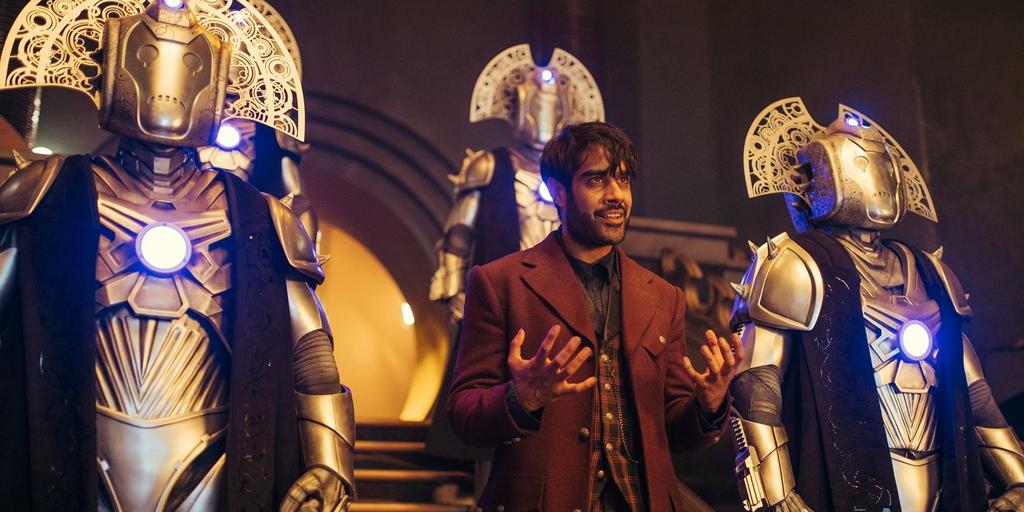
I'm sure not gonna complain about the Cyber-Timelords! Cyber-timelords were the best thing about this story, they are SO TRANSCENDENTLY DUMB that they wrap around to being kind of awesome. Good lord, the collars and robes look SO SILLY, i LOVE it. Chibshow would be a lot better if they embraced camp and leaned into the ridiculousness, instead of trying so hard to replicate the surface texture of Prestige Drama.
No, what's dumb is that Chibshow can't decide why her decision matters, morally.
"The Doctor genocided Gallifrey to save the universe from the Daleks, and feels real angsty about it" was the founding myth of the revived series. Revisiting that should be a big deal, a huge deal. (We already re-visited the dilemma in "Parting of the Ways" and re-re-visited in "Day of the Doctor" so this is a re-re-re-visitation.)
Is this a dilemma because she cares about Gallifrey? But she's never liked Gallifrey, we've never seen the current incarnation have a single positive interaction or thought about the planet or the Time Lords, and this whole episode has done nothing but give her new reasons to hate them. Besides, Gallifrey's already destroyed, it's not clear if the Time Lords could be deconverted/resurrected.
Is it a dilemma because she wants to save/redeem the Master? That was a plot in season 10, with Peter Capaldi and Missy, and it was great, but there's been no indication of it in this season. She hasn't even really tried talking him out of this plan.
The Master in this scene is playing up the "do it! so you'll become like me!" angle. So is it about the Doctor not wanting to become like him? Despite the episode having done no groundwork at all to establish that as a potential issue? Oh wait-- oh no -- this is a repeat of last season's extremely boring "Graham, if you kill Tim Shaw you become like him" dilemma isn't it?
Or is it just about the implications of suicide? "The universe needs The Doctor, so you can't sacrifice yourself", that sort of thing? It could work if you had set up a character arc where she's unsure of the value of her own life. Any of these ideas could work, if you had set it up and then followed through on it.
The episode's actual solution is the worst part. She decides she can't push the button. But then this other guy, an NPC named Ko Sharmus runs into the room, and takes the Death Particle, and tells the Doctor to run, and he pushes the button instead!
What a cop-out! What's the idea here: Genocide happens, but since the Doctor didn't personally press the button, there's no need to feel guilty about it? Because morality is about whether you personally keep your hands clean, not about whether a planet gets genocided or not. And if you delegate the button-pressing to other people, you're not responsible.
It's not even a surprise, really: Ko Sharmus's dialogue right before the climax is literally:
so they as good as told us what was gonna happen! The whole time the Doctor is angsting over pressing the button we're just thinking "Ko Sharmus is gonna do it"!
This ending reveals it was never really a moral dilemma at all, it was just about the plot logic of figuring out how to destroy the Cyber-Timelords while keeping the Doctor alive. The story structure tells Chibnall he needs to put a dilemma at the climax, so he put this scene that has the shape of a dilemma, but there's no content to it.

